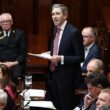
The nationalisation of Anglo Irish Bank is an indication of the abject failure of the Fianna Fail and Green government to deal with the banking crisis, but also that the crisis has reached a new and dangerous level. In the wake of the nationalisation, the shares of the two main banks, Allied Irish Bank (AIB) and Bank of Ireland (B of I), plummeted.
The Irish government’s response to the economic and financial crisis has been characterised by a tentative continuation of right-wing neo liberalism, which is always careful to safeguard business interests and property rights. They certainly did not want to nationalise anything. In fact, with their blanket guarantee of bank assets last September, they hoped that their word would be enough to safeguard the Irish banking system. However, as is inevitable in a serious economic crisis, their word was never going to be enough.Just as the government were about to implement their recapitalisation programme for Anglo Irish Bank, the situation changed and they were forced to abandon it. That the government felt compelled to nationalise what, in terms of the value of loan liabilities, is Ireland’s third biggest bank shows how their policies are being compelled to shift away from free market capitalism.
Neither the government’s bank guarantee, or their plan to take control of 75% of Anglo shares, were enough to save the bank from collapse. Already, in the last weeks, major depositors were withdrawing their cash and with S & P (Standard and Poor), an important bank rating agency, about to significantly downgrade Anglo’s credit rating, Anglo would have become insolvent.That Fianna Fail and the Green Party nationalised a bank that was not seen as being essential or strategically vital to the future of the economy, at what will be a huge cost to the public purse, raises serious questions as to why Anglo was nationalised. It is true that Anglo’s portfolio is dominated by builders, speculators and business spivs. They used it to organise extreme profiteering, particularly from the property bubble, which, in turn, has made the economic crisis much worse.
The Socialist Party is opposed to the capitalist nationalisation of Anglo, which is about saving individual business tycoons, on the one hand, and the capitalist financial system, on the other. We demand that Anglo and all the main banks be immediately nationalised and taken into democratic public ownership, with no benefit or compensation for the big business sharks. Compensation should be provided only on the basis of proven need.Undoubtedly, the demise of Anglo is a very dirty, grubby affair. It is clear that many developer friends of Fianna Fail, and particularly the billionaire, Sean Quinn, are relative beneficiaries from this nationalisation. Some of the debts that Anglo holds (“undated subordinated debt”) would not have been guaranteed by the government’s bailout scheme if Anglo had collapsed. With this nationalisation, the state (and, by implication workers/taxpayers) will bear the ultimate liability for losses in Anglo’s portfolio.
Due to the deal it struck with Sean Quinn, when he borrowed vast sums (before nationalisation Quinn owned a 15% share in Anglo), the bank had the power to take over a controlling interest in most of the Quinn Group’s companies and would probably have been forced to act on this clause if bank hit difficulties. Quinn’s various companies employ over 8,000 workers. Undoubtedly, Quinn is hoping for more sympathetic treatment from his pals in Fianna Fail over the next weeks and months.
Investigations were already afoot, into the €179 million worth of loans given to former Anglo Chairman Sean Fitzpatrick and other board members and into the loans and shares that Sean Quinn has with the bank. Undoubtedly, rotten practices were in operation. If information emerged, confirming that Fianna Fail’s inaction regarding the goings on at Anglo or that its nationalisation of Anglo was, to a large extent, about bailing out its friends, then the government could be fundamentally weakened.
Whatever role political patronage and corruption played in the decision to nationalise Anglo, its collapse, in the current circumstances, would have threatened a systemic collapse of Irish banking. Those economists who say it should have been allowed to collapse are basing themselves on the idea that Anglo is not strategically vital to the Irish economy. While that is partly true, it doesn’t mean its sudden, inglorious collapse would have had no effect on the rest of the banks, the banking system and the economy generally.







